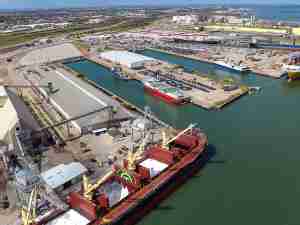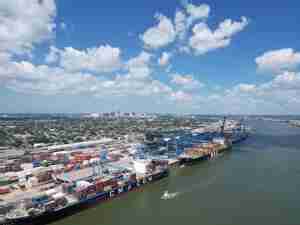Harris County Judge Ed Emmett and U.S. Coast Guard Captain Brian Penoyer joined Houston Ship Channel Security District (HSCSD) chairman Gary Scheibe in outlining training initiatives and joint communication and response efforts that protect the Houston Ship Channel region. The three provided comments during an HSCSD news conference following the annual meeting of the District's 160 members.
Judge Emmett mentioned that Harris County was instrumental in getting the HSCSD started and helped secure and implement high technology communication systems benefitting District members. Additionally, Harris County Sheriff's officers are actively patrolling the District by land and sea. Emmett, who leads the county's homeland security and emergency management efforts, pledged the county's commitment to continue to work collaboratively on efforts to protect America's most important oil port and the largest U.S. refining and petrochemical complex.
Captain Penoyer mentioned that it gives him a sense of security knowing that he has an organized resource like the HSCSD to not only call upon during emergencies, but to partner with on a vast range of initiatives to ensure the safety and security of the Houston Ship Channel region. His cited the Texas City Y oil spill event as an example when District resources provided on-water patrols while the spill engaged the full resources of the U.S. Coast Guard Sector Houston–Galveston. Captain Penoyer said he appreciates the assistance and is comforted to know that, if there is a security issue in the Port of Houston, he has resources at hand that he can quickly gather to resolve the matter and get traffic and commerce moving again.
District improved surveillance detection and terrorism and IED screening techniques
During the annual meeting, HSCSD Chairman Scheibe outlined various collaborative training programs and security initiatives. Implementing on-line training has provided easier access for first responders, security managers, and site personnel to meet Department of Homeland Security (DHS) and U.S. Coast Guard requirements for training on risk mitigation, identifying and reporting IEDs (improvised explosive devices), and other security threats. Additionally, the District hosts in-person training sessions by DHS personnel.
More than150 personnel from District member companies received instruction to improve surveillance detection measures and terrorism and IED screening techniques. Scheibe said more training would be provided in 2015, including training on the national incident management system (NIMS).
Scheibe said that, from January through September 2014, the HSCSD supported more than 1,000 hours of waterborne patrols, 2,000 hours of land patrols and 700 hours of flights above area facilities. "These patrols allowed our law enforcement partners to complete more than 1,000 hours of training, conduct thousands of critical infrastructure inspections, and assist in criminal investigations and special assignments," Scheibe told members of the HSCSD.
"The Houston Ship Channel is better prepared to deal with a security incident than other ports around the world due to the collaboration of the agencies and industry members, and the training and equipment resources we have assembled for this region," Scheibe said.
Many of the HSCSD partners and members displayed equipment in the hotel parking lot outside the meeting. Equipment included helicopters, boats and mobile command units.
U.S. Coast Guard Assistant Commandant for Prevention Policy, Rear Admiral Paul Thomas, who once was commanding officer of the Marine Safety Unit in Galveston, delivered the luncheon keynote. He also stressed the value of having well-trained personnel and additional resources to partner with on security initiatives and to call upon during emergencies.
Collaboration & Training Initiatives Critical to Protect Houston Ship Channel
By: Houston Ship Channel Security District | Nov 12 2014 at 11:56 AM | Ports & Terminals










